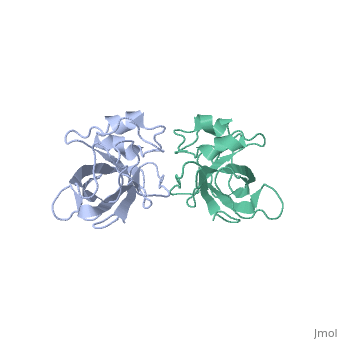We apologize for Proteopedia being slow to respond. For the past two years, a new implementation of Proteopedia has been being built. Soon, it will replace this 18-year old system. All existing content will be moved to the new system at a date that will be announced here.
1whi
From Proteopedia
(Difference between revisions)
| Line 3: | Line 3: | ||
<StructureSection load='1whi' size='340' side='right'caption='[[1whi]], [[Resolution|resolution]] 1.50Å' scene=''> | <StructureSection load='1whi' size='340' side='right'caption='[[1whi]], [[Resolution|resolution]] 1.50Å' scene=''> | ||
== Structural highlights == | == Structural highlights == | ||
| - | <table><tr><td colspan='2'>[[1whi]] is a 1 chain structure with sequence from [ | + | <table><tr><td colspan='2'>[[1whi]] is a 1 chain structure with sequence from [https://en.wikipedia.org/wiki/Geobacillus_stearothermophilus Geobacillus stearothermophilus]. Full crystallographic information is available from [http://oca.weizmann.ac.il/oca-bin/ocashort?id=1WHI OCA]. For a <b>guided tour on the structure components</b> use [https://proteopedia.org/fgij/fg.htm?mol=1WHI FirstGlance]. <br> |
| - | </td></tr><tr id=' | + | </td></tr><tr id='method'><td class="sblockLbl"><b>[[Empirical_models|Method:]]</b></td><td class="sblockDat" id="methodDat">X-ray diffraction, [[Resolution|Resolution]] 1.5Å</td></tr> |
| - | <tr id='resources'><td class="sblockLbl"><b>Resources:</b></td><td class="sblockDat"><span class='plainlinks'>[ | + | <tr id='resources'><td class="sblockLbl"><b>Resources:</b></td><td class="sblockDat"><span class='plainlinks'>[https://proteopedia.org/fgij/fg.htm?mol=1whi FirstGlance], [http://oca.weizmann.ac.il/oca-bin/ocaids?id=1whi OCA], [https://pdbe.org/1whi PDBe], [https://www.rcsb.org/pdb/explore.do?structureId=1whi RCSB], [https://www.ebi.ac.uk/pdbsum/1whi PDBsum], [https://prosat.h-its.org/prosat/prosatexe?pdbcode=1whi ProSAT]</span></td></tr> |
</table> | </table> | ||
== Function == | == Function == | ||
| - | [ | + | [https://www.uniprot.org/uniprot/RL14_GEOSE RL14_GEOSE] Forms part of two intersubunit bridges in the 70S ribosome (By similarity). Binds to 23S rRNA. |
== Evolutionary Conservation == | == Evolutionary Conservation == | ||
[[Image:Consurf_key_small.gif|200px|right]] | [[Image:Consurf_key_small.gif|200px|right]] | ||
| Line 19: | Line 19: | ||
</jmol>, as determined by [http://consurfdb.tau.ac.il/ ConSurfDB]. You may read the [[Conservation%2C_Evolutionary|explanation]] of the method and the full data available from [http://bental.tau.ac.il/new_ConSurfDB/main_output.php?pdb_ID=1whi ConSurf]. | </jmol>, as determined by [http://consurfdb.tau.ac.il/ ConSurfDB]. You may read the [[Conservation%2C_Evolutionary|explanation]] of the method and the full data available from [http://bental.tau.ac.il/new_ConSurfDB/main_output.php?pdb_ID=1whi ConSurf]. | ||
<div style="clear:both"></div> | <div style="clear:both"></div> | ||
| - | <div style="background-color:#fffaf0;"> | ||
| - | == Publication Abstract from PubMed == | ||
| - | BACKGROUND: Detailed structural information on ribosomal proteins has increased our understanding of the structure, function and evolution of the ribosome. L14 is one of the most conserved ribosomal proteins and appears to have a central role in the ribonucleoprotein complex. Studies have indicated that L14 occupies a central location between the peptidyl transferase and GTPase regions of the large ribosomal subunit. RESULTS: The crystal structure of L14 from Bacillus stearothermophilus has been solved using a combination of isomorphous replacement and multiwavelength anomalous dispersion (MAD) methods. The structure comprises a five-stranded beta-barrel, a C-terminal loop region that contains two small alpha-helices, and a beta-ribbon that projects from the beta-barrel. An analysis of the structure and the conserved amino acids reveals three surface patches that probably mediate L14-RNA and L14-protein interactions within the ribosome. CONCLUSIONS: The accepted role of ribosomal proteins is to promote the folding and stabilization of ribosomal RNA. The L14 structure is consistent with this notion, and it suggests that the RNA binds in two sites. One RNA-binding site appears to recognize a distinct region of ribosomal RNA during particle assembly. The second site is smaller and may become occupied during the later compaction of the RNA. The surface hydrophobic patch is a likely site of protein-protein interaction, possibly with L19. | ||
| - | |||
| - | The crystal structure of ribosomal protein L14 reveals an important organizational component of the translational apparatus.,Davies C, White SW, Ramakrishnan V Structure. 1996 Jan 15;4(1):55-66. PMID:8805509<ref>PMID:8805509</ref> | ||
| - | |||
| - | From MEDLINE®/PubMed®, a database of the U.S. National Library of Medicine.<br> | ||
| - | </div> | ||
| - | <div class="pdbe-citations 1whi" style="background-color:#fffaf0;"></div> | ||
==See Also== | ==See Also== | ||
*[[Ribosomal protein L14|Ribosomal protein L14]] | *[[Ribosomal protein L14|Ribosomal protein L14]] | ||
| - | == References == | ||
| - | <references/> | ||
__TOC__ | __TOC__ | ||
</StructureSection> | </StructureSection> | ||
| - | [[Category: | + | [[Category: Geobacillus stearothermophilus]] |
[[Category: Large Structures]] | [[Category: Large Structures]] | ||
| - | [[Category: Davies | + | [[Category: Davies C]] |
| - | [[Category: Ramakrishnan | + | [[Category: Ramakrishnan V]] |
| - | [[Category: White | + | [[Category: White SW]] |
| - | + | ||
| - | + | ||
Current revision
RIBOSOMAL PROTEIN L14
| |||||||||||


